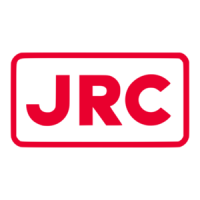4-45 Chapter 4 Conning Display
1
2
3
4
5
6
7
8
9
10
11
12
13
14
15
16
17
18
19
20
21
22
23
24
25
26
27
付録
Memo
No symbol is displayed with the wind bearing 0°or 180°.
Beaufort wind-force scale table
Wind-
force
scale
Name
Equivalent
wind force
Condition on the land Condition on the sea
Shape of
arrow
feathers
*1
0 Calm 0 to 0.2m/s Smoke rises straight
upwards.
The water surface is calm
like a mirror.
No arrow
feathers
1 Light air 0.3 to 1.5m/s Smoke trails to the
degree that indicates
the wind direction.
The surface of the water
ripples, such as fish
scales.
2 Light breeze 1.6 to 3.3m/s Sensation of wind is
felt on the face.
Leaves sway.
The surface of water form
definite ripples.
3 Gentle breeze 3.4 to 5.4m/s Leaves and small
branches sway.
Wave crests are broken,
starting to create white
foam.
4 Moderate
breeze
5.5 to 7.9m/s Wind raises cloud of
dust and small rubbish
and fallen leaves are
blown up in the air.
Small waves appear and
white foams increases.
5 Fresh breeze 8.0 to
10.7m/s
Shrubs with leaves
start to sway.
Wave crests appear on the
water surface.
6 Strong breeze 10.8 to
13.8m/s
Large branches of
trees sway, making it
difficult for anyone to
hold umbrellas. Cables
make a sound.
Wave crests with white
foams spread.
7 High wind /
Moderate gale
/ Near gale
13.9 to
17.1m/s
Whole large trees
sway, making difficult
to walk against the
wind.
Wave crests are broken
and white foams are blown
away by the wind.
8 Gale / Fresh
gale
17.2 to
20.7m/s
Small branches are
broken, making
impossible to walk
against the wind.
Slightly small swell. Wave
crests are broken, sending
up clouds of spray and
foams are blown away,
creating trails of lines.
9 Strong gale 20.8 to
24.4m/s
Roof tiles are blown
away. The wind starts
to cause some
damage to houses.
Swell. Foams are blown
away, drawing lines. Wave
crests collapse and start
whirling in reverse.

